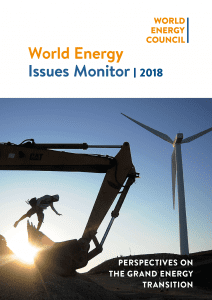Enabling the Energy Transition with Blockchain

A new survey highlights shifting priorities in the energy sector with an accelerating transition towards digitailisation, decentralisation and decarbonisation. On a global scale, innovative technologies such as electric storage, renewable energies and market design are impacting top action priorities for energy leaders globally in 2018.
Blockchain technology is ranked high in impact and uncertainty within every region identified in the survey of more than 1,200 energy leaders in 95 countries. This is in addition to a survey issued to more than 100 innovators earlier in the year, launched at the 2018 Start-up Transition Energy Award in Berlin,16 April.
In its ninth year, The World Energy Issues Monitor 2018: ‘Perspectives on the Grand Energy Transition‘ published by the World Energy Council, through an analysis of critical issues affecting the energy system, provides nine global, six regional and 38 national issues maps, as well as an interactive online tool produced in collaboration with Arup.
Dr Christoph Frei, Secretary General of the Council said: “Our Issues Monitor is key to the Council’s transition toolkit, providing unique global, national and regional perspectives into issues central to the energy transition. It provides a snapshot of the current priorities, keeping energy leaders awake at night and busy at work. We are seeing an important shift in policy and strategy priorities: innovative transport, decentralisation and digitalisation have continued to trend upwards, while centralised technologies such as coal and CCS continue to decline as priorities for energy leaders.”
Other key findings in 2018 include:
- Renewable energies are ranked high in terms of certainty and their high potential to compete with traditional fuels across the world
- Data Artificial Intelligence and mobile cloud are enabling the rise of the prosumer as new actors such as tech companies are entering the energy system
- Digitalisation and cyber threats are perceived as a priority among energy leaders in OECD countries in comparison to non-OECD countries
- Fossil fuels remain an important part of the world’s global energy mix despite many countries increasingly incorporating clean energy policies
The interactive toolkit will be launched in Copenhagen at the 9th Clean Energy Ministerial on 23 May followed by further presentations at regional events being held.
Ian Gardner, Global Head of Energy, Arup, commented: “Arup recognises how challenging the times ahead are for energy markets across the world and we are pleased to be involved in the launch of the improved Issues Monitor. Our specialist digital team has developed the new online tool which will allow the Council and its stakeholders to access, ask questions and report on all aspects of the data that it has gathered that has previously been unavailable. By making this more accessible, we make the data more valuable and useable and therefore enabling better decision making for governments and organisations. We are delighted to be supporting this thinking which can improve energy usage across the world. Energy and digital cannot be considered without the other and using data and technology to inform better energy decisions is a great programme to be involved in.”
Dr Frei commented: “The survey illustrates much alignment for most priorities and some significant differences against the context of the grand energy transition between innovators, and energy leaders at a global, national and regional level.”
End
For further information, contact:
Lucy Chakaodza [email protected] | Tel: (+44) 20 3214 0616
Click here to download the Executive Summary:
Notes to Editors:
About the World Energy Issues Monitor
The World Energy Issues Monitor provides a snapshot of what keeps CEOs, Ministers and experts awake at night in more than 90 countries. The monitor helps to define the world energy agenda and its evolution over time. It provides a high-level perception of what constitute issues of critical uncertainty, in contrast to those that require immediate action or act as developing signals for the future. It is an essential tool for understanding the complex and uncertain environment in which energy leaders must operate, and a tool through which one can challenge own assumptions on the key drivers within the energy landscape.
About the interactive tool
The World Energy Issues Monitor Tool presents in one place dynamic map views of the decade of Issues Monitor data that has been collated by the World Energy Council. The maps convey a narrative of the key energy issues, regional and local variances and how these have changed over time. The tool allows the preparation of different maps for comparison and allows for the manipulation of data by geography, over time, or by highlighting of specific energy issues.
About the World Energy Council
The World Energy Council is the principal impartial network of energy leaders and practitioners promoting an affordable, stable and environmentally sensitive energy system for the greatest benefit of all. Formed in 1923, the Council is the UN-accredited global energy body, representing the entire energy spectrum, with over 3,000 member organisations in over 90 countries, drawn from governments, private and state corporations, academia, NGOs and energy stakeholders. We inform global, regional and national energy strategies by hosting high-level events including the World Energy Congress and publishing authoritative studies, and work through our extensive member network to facilitate the world’s energy policy dialogue. Find out more www.worldenergy.org and follow @WECouncil


